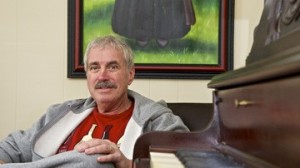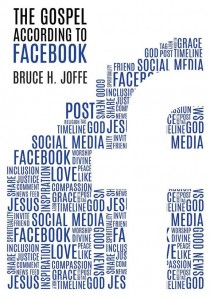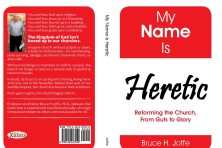Bruce Joffe Publishes ‘The Gospel According to Facebook’
- Share
- Tweet
- Pin
- Share

“You can not put our creator in a box,” says Bruce Joffe. “There are so many creeds, like the Apostles’ Creed, that try to define God, who is more than that.” Photo by Len Villano.
“Jesus wants us to be welcoming,” smiles pastor, professor, and author Bruce Joffe, swirling his wine, sitting in an armchair beneath a classic Fernando Botero painting of a overweight clergyman holding an umbrella. “So many people feel less than whole or complete – because of little things, because of what ‘the church’ calls tradition. People are very attuned to these traditions – it influenced the way people grew up, how they saw themselves, who they married, how they raised their children.”
A few of these traditions include assigning God a gender role, “The god that I know, that I pray to, that I love, isn’t a man,” says Joffe; treating the bible as complete fact, “I could be called a heretic for saying it really doesn’t matter if Jesus was bodily resurrected in three days or not;” and discriminating against homosexuals, transsexuals, divorcees, women, ‘sinners,’ “I’m shocked by the number of people who are trying to come to grips, who are in conflict – they know who they are inside, but outside sources are telling them, ‘No. No, you can’t be this.’”
Joffe’s path to becoming a ‘religious activist,’ as he calls himself, began in a Jewish Temple while growing up in New York City. “I was born a Jew, did all the rituals, had a Bar Mitzvah,” he explains. When he took a teaching job at a Catholic high school, “I thought the least I can do is read their book,” he laughs. “I became a Christian by studying. I was convinced from the Hebrew testament, through studies and friends, that Jesus was the Messiah. I was one of the first Jewish Christians, before the ‘Jews for Jesus’ movement. I was a freak.”
He then became a college professor at George Mason University in Virginia, teaching journalism, marketing and public relations. That transitioned into Gender Studies. He taught classes on gender differences in films, wrote scholarly essays, and books on the topic including A Hint of Homosexuality: ‘Gay’ and Homoerotic Imagery in American Print Advertising and Square Peg in a Round Hole.
“I developed through my publications a reputation that [the University of Wisconsin – Kenosha/Racine] recruited me to create a program that would lead to a minor in LGBT Studies and if not a minor, a certificate program. I put together a program for them.”
He also became the founding executive director of the LGBT Center of Southeast Wisconsin in 2008. A 16-year-old boy who took his own life inspired the creation of the center. “He had been bullied, had a hard time accepting his sexual identity,” explains Joffe.
In addition to running the center, fundraising, and public relations, Joffe worked with clients. “I did some ‘intake,’” he says. “How can I help you?” He was overwhelmed with the number of individuals who believed they were “going to hell” because of their sexual identity.
“I want to be happy, but how can I be happy if I’m going to hell?” they would ask Joffe. “Why do you think you’re going to hell?” he would ask, sitting down with them over the bible. “There are seven verses taken out of context that pretty much the ‘religious right’ zero in on,” says Joffe. “We would go through scripture by scripture, look at the time and culture in which it was written, look at translations.”
This experience influenced the way Joffe saw God. “Over this process, I evolved, I started to realize that you can not put our creator in a box. There are so many creeds, like the Apostles’ Creed, that try to define God, who is more than that.”
He started questioning the church, its influence, its message. “At the time, I happened to be attending a Methodist church with a female pastor. She gave a sermon one day where she told us her own story, what it’s like to be a female growing up in this country. She said that when churches would go to find pastors, the first people they picked were men. She told the story in such detail, I had a lump in my throat, tears in my eyes. I thought, ‘How can this be?’ How can the church, which is so pervasive, so influential, be so unchristian like?’”
Over the two years Joffe was director of the LGBT Center, “the more convinced I was that religious, organized religion, had taken a toll,” he explains, “not a good toll.”
In 2010, Joffe accepted a position to pastor a church in Jacksonville, Florida, where he worked one-on-one with the diverse congregation and wrote for a number of magazines including Charisma Magazine, Christian Magazine, Christian Monthly, Today’s Christian Women, and Leadership.
“My theology really evolved counseling people,” he explains. “You are constantly in dialogue with God.”
Over the course of that experience Joffe “came to believe that the ‘Kingdom of God’ is about inclusiveness not exclusion,” he explains. “We’re not to say, ‘Everyone in this circle is allowed, everyone else is going to hell.’ I don’t think we all have to be a cookie-cutter Borg from Star Trek.”
After two years of living in Florida, he returned to Virginia and had trouble finding a church, “There was not one progressive church,” he said, “all the usual suspects.” Someone suggested he start his own church.
“That’s a very specific talent,” he replied.
“You could use Facebook!,” someone suggested.
“I found Facebook fascinating, fun, addicting,” says Joffe. “In many ways there are a lot of parallels to the way people reacted to and followed Facebook and the way they reacted and followed church.”
He started a small, at-home church. “I made a list of things that I believe. Come in, have a bagel and coffee – didn’t Jesus eat with everybody? He was Jewish, I’m Jewish, eat!
“We met a couple times, got in the living room, around the piano. We sang songs, talked, shared.”
There were difficulties, however, timing conflicts, paperwork. Joffe focused his ministry on Facebook and created a page that now has more than 450 followers: Shalom Spiritual Community.
“I found that Facebook was evolving into this community of faith. I was finding that there were people who were not going to church – faithful people who had been hurt by the church, a pastor, or they didn’t accept churches, couldn’t find a church.”
Through his Facebook page, Joffe offered short sermons, daily devotions, mediations or links to music. “People would ask for prayer. The virtual community was growing and growing.”
While living in Virginia he began writing his recently published book, The Gospel According to Facebook: Social Media and the Good News. The book examines the influence of Facebook, and describes Joffe’s experience reaching out to others through the social media website, features letters and emails exchanged by someone who first wrote to the Peninsula Pulse, and inspirational quotes about love, religion, and acceptance from Albert Einstein to Oprah Winfrey, Mother Theresa to John Lennon.
He finished the book after moving to Door County in April of 2013, where he attends Hope United Church of Christ, continues to minister through his Facebook page, and will soon open an antique store in Egg Harbor.
Overall, his focus is on spreading a loving message to others: “Focus on love,” he says, “not being judgmental. Focus on helping, on taking care of each other.”
Feb. 24 at 7 pm, Hope United Church of Christ in Sturgeon Bay will host a free reading by Joffe of The Gospel According to Facebook. The book is available from all online booksellers and some local retail bookstores.
For more information search Shalom Spiritual Community on Facebook.


